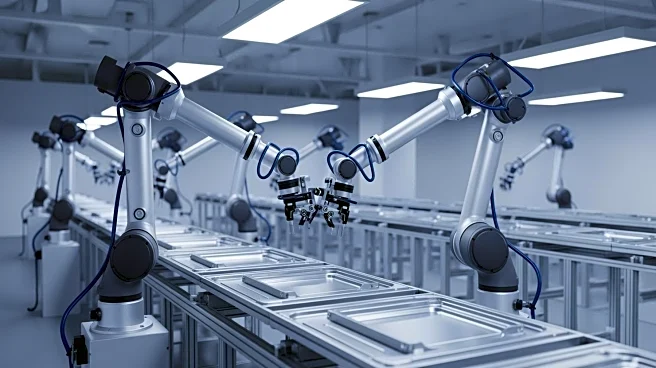What's Happening?
Whirlpool Corporation has announced a $300 million investment in its laundry manufacturing facilities located in Clyde and Marion, Ohio. This move is expected to create up to 600 new jobs, enhancing the
company's domestic manufacturing capabilities. The Clyde facility is recognized as the largest washing machine plant globally, while the Marion factory specializes in dryer production. Whirlpool's investment will be supported by financial assistance from JobsOhio and tax credits from the State of Ohio. The company emphasizes its commitment to American manufacturing, with 80% of its appliances sold in the U.S. being built domestically. Whirlpool sources 96% of the steel used in its products from within the U.S., positioning itself as a leader in domestic appliance manufacturing.
Why It's Important?
Whirlpool's investment underscores the significance of domestic manufacturing in the U.S. economy, particularly in the face of global trade uncertainties and tariff changes. By expanding its operations in Ohio, Whirlpool is not only creating jobs but also reinforcing its competitive advantage against international competitors like LG and Samsung, which manufacture most of their appliances overseas. This move aligns with broader industry trends where companies like GE Appliances are also increasing their U.S. investments. The focus on domestic production is crucial for economic stability, especially as the U.S. navigates potential changes in trade agreements and tariff policies. Whirlpool's strategy may serve as a model for other manufacturers considering reshoring their operations.
What's Next?
The investment in Ohio is part of Whirlpool's broader strategy to leverage its U.S.-based manufacturing footprint amidst evolving trade policies. As the company navigates market challenges such as reduced consumer demand and a sluggish housing market, it remains committed to maintaining its domestic production advantage. The success of this investment could influence other manufacturers to reconsider their production strategies, potentially leading to increased reshoring efforts. Additionally, Whirlpool's focus on domestic manufacturing may prompt discussions on policy incentives to support U.S. manufacturing, especially in light of global economic shifts.
Beyond the Headlines
Whirlpool's investment highlights the ethical and economic dimensions of domestic manufacturing. By prioritizing U.S. production, the company supports local economies and job creation, contributing to community development. This approach also reflects a strategic response to global trade dynamics, where reliance on international manufacturing can pose risks due to geopolitical tensions and supply chain disruptions. Whirlpool's commitment to sourcing materials domestically further emphasizes sustainability and resource efficiency, aligning with broader environmental goals.










